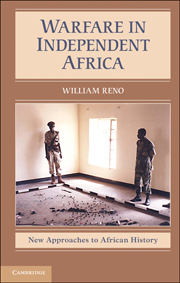5 - Warlord Rebels
Published online by Cambridge University Press: 05 June 2012
Summary
Widespread fighting started in 1996 in Zaire, which in 1997 was renamed the Democratic Republic of Congo. According to one estimate, by 2004 this conflict had killed 3.9 million people from direct violence and the effects of the breakdown of public order. By 1994, four years of fighting in Liberia had driven more than 794,000 people, about 30 percent of the country's population, to seek refuge in neighboring countries. About 30 percent of Sierra Leone's population, or 1.15 million people, were internally displaced or became refugees in 1999, the eighth year of that war. These measures of disorder reflected the failure of warlord rebels to build liberated zones, protect non-combatants, or rally people around convincing political programs as alternatives to corrupt or oppressive regimes. Warlord rebels tended to devote at least as much time to fighting among themselves as to fighting government forces. Much the same can be said of government forces that also suffered factional splits and preyed on their own citizens.
Warlords dominated conflicts in the 1990s and early 2000s in Liberia, Sierra Leone, Côte d'Ivoire, and Guinea-Bissau. They also played major roles in Congo, Somalia, and elsewhere. People in these places often saw warlord rebels as at least as corrupt and oppressive as their often-violent and disorganized governments. Although some warlords had significant support from communities that stood to benefit if the warlord was able to seize state power, warlords did not court mass domestic or foreign support.
- Type
- Chapter
- Information
- Warfare in Independent Africa , pp. 163 - 205Publisher: Cambridge University PressPrint publication year: 2011



